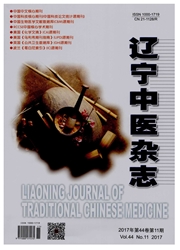

 中文摘要:
中文摘要:
目的:观察酸枣仁皂苷A对过氧化氢诱导心肌细胞凋亡的保护作用及其机制。方法:采用差速贴壁法体外分离培养新生乳鼠心肌细胞,以500μmol/L过氧化氢作用4h建立心肌细胞氧化损伤模型,以酸枣仁皂苷A(20rag/L)在造模前干预24h。四唑盐(MTT)比色法检测心肌细胞活力;流式细胞仪检测细胞凋亡率;Caspase活性定量检测caspase-3及caspase-9的活性。结果:模型组经500μmol/L过氧化氢作用4h后,细胞活力显著下降,凋亡率显著增高。与模型组比较,酸枣仁皂苷A提高细胞活力及显著降低细胞凋亡率。模型组的easpase-3及caspase-9活性显著升高。与模型组比较,酸枣仁皂苷A组的caspase-3及caspase-9活性显著下降。结论:酸枣仁皂苷A可抑制过氧化氢诱导心肌细胞损伤,这可能与其抑制线粒体信号通路中caspase-3及caspase-9的活性有关。
 英文摘要:
英文摘要:
Objective :To study protective effect and mechanism of Jujuboside A on damage induced by hydrogen peroxide in myocardial cell. Methods:Primary cultured neonate rat myocardial cell was cultured in medium with 500μmol/L hydrogen peroxide, and the medium was supplemented with jujuboside A in advance of 24 hours, viability of myocardial cell was assayed by MTT. Apoptosis rate was determined by flow cytometric analysis. Besides, the activities of caspase -3,9 were also observed by easpase eolofimetrie assay kit in each group. Results : In model group, cell viability decreased significantly and apoptosis rate rose significantly compared with normal group. Comparing with model group ,Jujuboside A increased cell viability and decreased apoptosis rat signliqcandy. Compared with normal group, the activities of caspase -3,9 increased remarkably in model group. Compared with model group,Jujuboside A decreased the activities of caspase- 3,9 significantly. Conclusion :Jujuboside A can reduce myocardial damage induced by hydrogen peroxide, the mechanism may be related with the decrease of easpase -3,9 of Mitochondria Pathway.
 同期刊论文项目
同期刊论文项目
 同项目期刊论文
同项目期刊论文
 期刊信息
期刊信息
